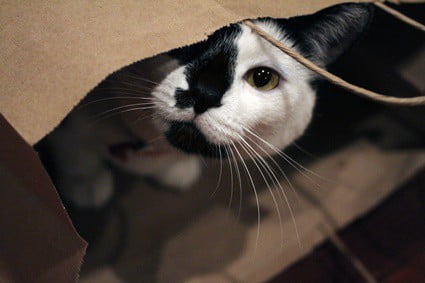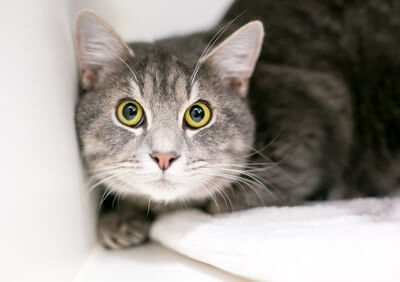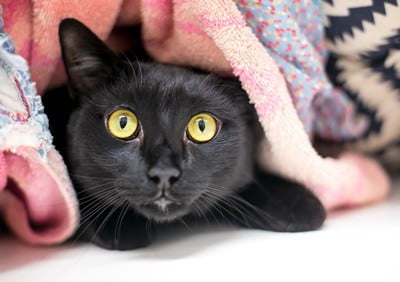If your cat is hiding or fleeing, then it’s feeling unsettled. It’s afraid that it’s at risk of harm or even that its life is in danger. If your cat’s demeanor has changed suddenly, there’s likely to be a fear-based explanation.
If your cat is suddenly scared of everything, consider if anything has changed in its living environment. Disruption to its routine, such as moving furniture and different people, can make cats skittish. Loud noises, predatory animals, pets, sickness, and injury can make cats feel more vulnerable.
Managing the needs of a scared cat requires a calm, relaxed owner. In fact, owner anxiety will make a worried cat feel even more jittery. You need to calm down your cat, but how you approach this depends on the cause.
Why Is My Cat Suddenly Frightened?
Cats like to project confidence and fearlessness, but this isn’t always how they feel inside. Cats are skilled at hiding their fear and trepidation as they don’t like people to know that they feel afraid or vulnerable.
If your cat has hurt itself, you may not know about it. Cats do all they can to disguise signs of physical injury. Your cat worries that injury is seen as a weakness, which could lead to them losing territory or dominant status.
The same applies to illness. Cats hide their pain but will be frightened by ill health. For example, according to Hormones and Behavior, parasitic infections (roundworms, tapeworms, heartworm, hookworms, and whipworms) cause anxiety as cats don’t understand what’s wrong with them.
The mistreatment of cats is a broad definition. Your cat may have been physically struck years ago. Unfortunately, certain scents and locations can trigger memories of this past traumatic event.
Scolding a cat for unwanted behaviors leads to anxious behavior. Anxiety and skittishness are likelier when punishment happens after the action because cats don’t link scolding to behavioral issues. Your cat will become nervous, wondering if it will be punished again.
What Makes Cats Feel Afraid?
Cats have an array of fears and phobias based on their instincts. Most are rational, but not all.
Common things that cats are afraid of include:
- Loud noises
- Changes to routine or schedule
- Unfamiliar people or pets in the home
- Wide-open spaces
- Predatory animals
- Visiting the vet
- Separation from an owner
- Traveling by car
Any of these issues can trigger a frightened response in a cat.
Anxiety takes its toll on cats. As per Applied Animal Behavior Science, stressed cats have much higher cortisol levels. Cortisol is colloquially referred to as the stress hormone. This explains why your cat is feeling on edge.
What are the Most Common Scared Cat Behaviors?
The signs of a frightened cat include:
- Hiding
- Freezing on the spot
- Eliminating outside its litter box
- Scenting from the anal glands
- Uncharacteristic aggression
- Frantic grooming to self-soothe
- Constant vocalization
- Refusal to eat, or eating to excess
- Clinginess
- Pacing around
All cats will display these behaviors occasionally, but your cat shouldn’t be constantly frightened and skittish.
Helping a Cat to Cope with Change
Cats are creatures of habit, so changes to their routine cause significant anxiety. If your cat doesn’t feel secure, it’ll feel increasingly nervous.
The most significant changes a cat can undergo are:
- A new living environment
- Getting a new pet
- Arrival of a new person or baby
A cat will notice if its owner is missing for longer than normal. Likewise, cats experience bereavement if a person or animal companion dies.
Living in a New Home
Moving home is overwhelming for cats because everything they know has changed. This means that a cat needs to learn everything all over again.
This is where a cat’s fear of open space comes to the fore. Until you unpack, the house will be bare. Your cat has lost all preferred hiding places. It needs to learn the new lay of the land and will be nervous until this happens.
Focus on providing your cat with some hiding spaces. Every time you unpack a box, leave the box on its side. Space these boxes around your new home, and your cat will feel more safe and secure.
Unpack familiar items for your cat. Furniture that carries your cat’s scent will have a calming effect. Ensure your cat has familiar toys and trees.
Adhere to your cat’s former routine and provide plenty of one-on-one attention. Feed your cat when it would expect to be fed.
Adjusting to a New Pet
The arrival of a new pet can deeply unsettle your cat. Cats are territorial by nature, and sharing a home with a potential rival could cause anxiety. Also, a new animal may bully an existing incumbent.
When introducing a new cat to your home, take the process slowly. Keep the new cat locked in a room until accepted by your existing pet. Introduce the two cats through a gate so that they can learn each other’s scents.
Feed the cats in separate locations. Provide each animal with its own food bowls, water supply, litter boxes, toys, and bed. Play with your cat and provide one-on-one attention.

New Home Resident
Cats grow used to the humans that share their home. When a new resident arrives, a cat will be perturbed. Babies will cause particular consternation.
Babies are loud and demand attention that used to go the cat. Your cat will become vocal and clingy, afraid that it has been replaced. The cat is imitating the behavior of the baby.
Friends and partners can also frighten cats. New people bring new scents, sounds, and behaviors. The cat will be initially afraid of this new person.
Once the cat starts marking the human, bonding can begin. Cats recognize humans by voice, not sight. The more a cat hears a new human speak, the sooner it will start to overcome its fear.
Noisy Environments
Cats have good hearing. Loud noises, especially short and sharp sounds, are stressful to cats. These unsettling background noises include:
- Car horns
- Garbage trucks
- Emergency vehicle sirens
- Fireworks
- Household appliances, such as vacuum cleaners
- Thunder and lightning
- Doorbells
- Home improvements
- Street works
Fear of Predators
As the Journal of Animal Ecology explains, the animal kingdom is divided into three tiers. These are prey, mesopredators, and superpredators. Cats are mesopredators. This means they are the hunters and the hunted.
Your cat may have encountered a predator in your yard. This will provoke significant, prolonged fear. Cats are driven by instinct and are always on the lookout for threats.
Wild animals that prey on cats include:
If your cat has become nervous, keep it indoors, especially at night. Over time, your cat will calm down and feel secure again. Until this happens, provide reassurance and a safe environment.
Separation Anxiety in Cats
If you leave your cat alone for a prolonged period of time, it may develop separation anxiety. The cat will be clingy and nervous when you return. Your cat is worried that you may leave again.
You will need to rebuild your cat’s trust and show your cat that you will not abandon it. You may have to help your cat realize that you always return home after a period of absence.
Expose your cat to a short time apart from you. When you return, offer your cat food so that it starts to see your return as a positive. Your cat will not fear your departure and look forward to your return.
Fear of the Dark
Despite often sleeping through the day, cats are not nocturnal. Felines are crepuscular. Crepuscular animals are most energetic at dawn and dusk.
Many domestic cats enjoy the darkness. Your cat’s night vision is not perfect, but it’s superior to that of humans. Domestic cats use the stillness of the night to explore and hunt. If your cat has developed a sudden fear of the dark, there are 3 explanations:
- The cat experienced a frightening experience at night
- The cat is fearful that you will not respond to its wishes at night
- The cat has developed cognitive dysfunction syndrome
If your cat ventures outside at night, it may have encountered a predator. The cat is afraid of reliving this experience. Keep your cat indoors at night. Play and feed it late in the evenings so that it’s more inclined to sleep.
Cats know that, while you are asleep, you will not provide attention. Your cat may be nervous and feel that it has not spent enough time with you. You may have forgotten an important activity.
Cognitive dysfunction syndrome impacts senior cats, typically older than 15 years. As explained by Veterinary Clinics, the symptoms include anxiety and clinginess, especially during the small hours of the morning.
Cats with cognitive dysfunction syndrome experience a reversed sleep-waking cycle. This makes the senior cat anxious and vocal at night. Your cat will become distressed at being parted from you while you’re asleep.

What Can Be Done About My Cat’s Nerves and Anxiety?
If you have attempted lifestyle changes to no avail, then your cat may have a generalized anxiety disorder. This is an illness caused by a chemical imbalance in the brain.
A vet can prescribe anti-anxiety medication, but cognitive-behavioral therapy may be recommended before going down this path. Many vets consider exposure therapy to be an effective treatment for feline phobias.
Exposure Therapy
Exposure therapy involves turning a negative experience into a positive experience. Expose your cat to whatever makes it nervous before offering play, petting, and grooming.
When the cat starts to calm down, offer it a treat. Your cat may start to look forward to something that previously provoked a fear response. If not, it will at least begin to become more tolerable.
Daily Management
An effective way to deal with a cat with generalized anxiety is to pretend it is invisible. Go about your daily routine as normal, and avoid unnecessary loud noises or routine changes.
Maintain your cat’s medication if it has a prescription. Continue to work on overcoming your cat’s fears. The following will start to calm your cat:
- Light scented candles, such as lavender or frankincense
- Play feline-appropriate music
- Give the cat more space
- Do not handle the cat too much
- Provide hiding places
Use of natural herbs to calm down an anxious cat. If the cat shows no negative reaction, gradually increase exposure. Suitable herbs include:
- Catnip
- Chamomile, such as dried flowers or tea
- Hops
- Valerian
Given time, many cats do begin to calm down. A cat with a generalized anxiety disorder may always be nervous, and such cats just need a peaceful living environment, affection, security, and understanding.


I just hate to see my cat of 16 years be so afraid,I have been all she has had all her life,I have never swatted her are any thing,she has been a good cat,I have been very good to her an she has been company to me,I live alone an she has been all I have had for 16 years,I hate to see her afraid of me I love her very much, thanks for your reading,
I’m so sorry, Jane, and can deeply empathize with you….my Maine Coon, Layla, turned 16 mid July and she’s declining fast. She hides under the couch all the time, scared all the time, and all I’ve done is love her and put her first in my life. She does have CKD and has now been diagnosed with Synovial Sarcoma in her swollen shoulder. Two months ago, out of nowhere, a male feral cat attacked her from behind, and at that point she was defenseless. This happened right in front of me and I was able to chase him off. Layla hasn’t been the same sense. She eats her prescription wet and kibble diet well, drinks quite a bit, bottled spring water, and she uses her litter box next to the couch. I’ve had to put her water and food bowls under the couch with her. I was hoping she could pass here at home with me. I’ve been doing a lot of praying over the situation, and am coming to the conclusion it may be time to put her to sleep. I’m old now, she’s all I have- no family, no friends- and since the first of March her decline has wreaked havoc within me. But I love her no matter what, and am very thankful she was put into my life.
On another note- Veterinary medicine has declined severly. The majority of them really only care about money, and they’re not very good at what they do. Arrogance and lack of work ethic runs high in them. I suppose it’s a generational thing.
Thank you for listening.
Exposure therapy? Sorry but that’s terrible advice. You don’t flood the cat with the thing that’s scaring her and just hope she’ll get used to it. If she ends up shutting down because she’s terrified and there’s no option to escape, owners might mistake that for calm behavior when it’s the complete opposite. Instead you should be using a tailored protocol of DS/CC. Please revise this, because your advice is just really irresponsible.